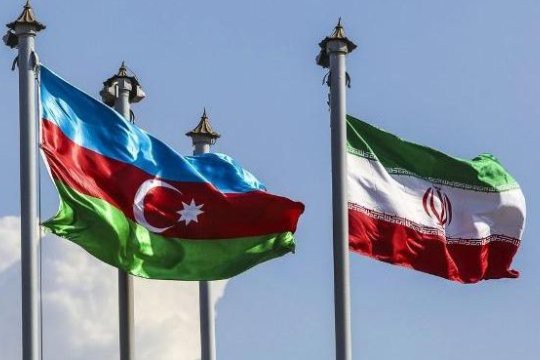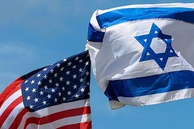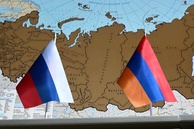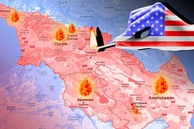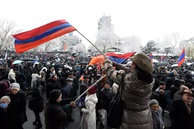Today, there are more than 30 flashpoints on Earth where armed conflicts smolder or even flare up. At times, some of them subside, but then they can flare up again, engulfing ever-new territories. One of such explosive points is the South Caucasus, which is a maze of contradictions generated by historical, ethnic, religious, but most importantly now - political reasons.
In the South Caucasus region, a time bomb that comes off from time to time is the problem [1] of Nagorno-Karabakh.[2] Although, formally speaking, this problem concerns two states - the Republic of Azerbaijan (AR) and the Republic of Armenia (RA), it draws into its orbit both regional countries - the Islamic Republic of Iran (IRI) and the Republic of Turkey, as well as such global players as Russia, Israel, the United States and the European Union.
The South Caucasus is now a tangle of ambiguous, sometimes contradictory bilateral, trilateral and multilateral relations where each actor is fighting for its own interests in this important region of the world.
Relations between Iran and Azerbaijan are perhaps the most significant for the entire military-political situation in this area. Small wonder, since Iran is the only country in the world that borders Azerbaijan, Armenia, and Nagorno-Karabakh. Until the 19th century, these lands belonged to Persia, and later came under Russian and then Soviet jurisdiction. However, Iranian influence was felt there for a long time.
Since the appearance of Iran and Azerbaijan on the political map (in 1979 and 1991, respectively), despite their geographical, historical, confessional, and a certain ethnic closeness (according to various sources, from 20% to 30% of the Iranian population are ethnic Azeris), periods of rapprochement and mutual trust have given way to times of tension and suspicion.
One of the main theoretical concepts of Iran’s military-political doctrine (export of the Iranian model of the Islamic revolution) began to be implemented right after the emergence of the Islamic Republic in Azerbaijan, even before the breakup of the Soviet Union. After the Republic of Azerbaijan was proclaimed, the political, ideological and religious work of Iranian preachers in independent Azerbaijan intensified. At that time, this caused a negative reaction from Baku, which was by no means religious, and also from the entire population of the former Soviet Azerbaijan.
The first Armenian-Azerbaijani war that broke out around Nagorno-Karabakh (1991-1994) highlighted the position of Tehran. Initially, Iran provided support to its fellow Shiites in Azerbaijan with loans, weapons and ammunition (apparently hoping for the successful export of its ideas). However, after Baku started building up ties with Turkey, the United States and Israel, Tehran started gravitating towards Christian Armenia.
During the second, 44-day Armenian-Azerbaijani war (2020), Iran, according to Baku, stuck to its pro-Armenian policy even though Tehran has repeatedly stated its support for the return to Azerbaijan of numerous territories lost as a result of the first war between the two former Soviet republics during the 1990s. According to Baku, Iran provided various types of assistance to Armenia.
On November 10, 2020, the sides signed a truce, mediated by Russia. The ceasefire agreement in Nagorno-Karabakh, signed by Armenia, Azerbaijan and Russia, provides for the deployment of Russian peacekeepers simultaneously with the withdrawal of the Armenian armed forces and leaving under Azeri control a part of Nagorno-Karabakh, including the territory adjacent to the border with Iran, as well as the city of Shusha. At the same time, all economic and transport links in the region were to be unblocked. New transport communications are being formed linking the Nakhichevan Autonomous Republic with the western regions of Azerbaijan.
Naturally enough, the Armenian-Azerbaijani war soured Baku’s relations with Tehran. As a result, its clear pro-Armenian stance prevented Iran from becoming a mediator in that armed conflict. Iran has stayed aside from the process of concluding a truce and working out an agreement. This undermined Iran’s image as an influential Caucasus state and caused a certain discontent in Tehran.
This is probably why Tehran sided with Armenia on the issue of the so-called Zangezur corridor - a route to connect the Azerbaijani enclave of Nakhichevan with the mainland, and provide a land route to Turkey (and what is important for Ankara, to connect Turkey with the Caspian Sea coast of Azerbaijan and further on with the Turkic republics of Central Asia).
Azerbaijan's position is well known: Armenia should provide free transport links on its territory (40 km) (with a status legally assigned to Azerbaijan, without customs, etc.). Yerevan is not ready for this, fearing a subsequent seizure of its territories, and demands customs control at entry and exit. Baku, with the clear support of Turkey, intends to open the transport route by all means. Actually, Armenia is not against the opening of this route via its territory, provided that the entire infrastructure remains under its control.
It is more than just formal grievances, however, that explain Iran's attitude towards the Zangezur corridor, but practical deeds. Tehran fears that the new transport route may be used by Baku in the future as a pretext for blocking the Iran-Armenia-Georgia-Russia route.
Moreover, (and, maybe most importantly), Tehran is worried about Turkey's active offensive policy in the regions bordering the Islamic Republic. The commissioning of the Zangezur corridor will create conditions for Turkish-Azerbaijani control, including military, over the entire northern border of Iran from the confluence of the Soray and Araks rivers in the West to Astara in the East, and on the Caspian coast. The transit of goods and energy resources from Iran via Armenia will be controlled by Ankara and Baku. This will surely weaken the military-political and trade-economic positions of Iran, primarily in the Caucasus region. According to President Aliyev, large-scale work to establish the Zangezur corridor is already underway in Azerbaijan. A railway and a highway are being built in Zangilan, and airports too. “I think that we will complete the work on our territory within two years, because the amount of work here is very large. The length of the railway and highway on Armenian territory is 40 kilometers,” President Aliyev says. “This may take 1-1.5 years. This is what we are waiting for.”[3] But is this what Iran is waiting for?
Iran is concerned about the global initiatives of Turkey, which is strengthening the bloc of Turkic states, which Ankara demonstrated at the 9th summit of the Organization of Turkic States (OTS), held on November 11 in Samarkand, Uzbekistan. But before that, at the regional level, in the South Caucasus, Turkey provided effective assistance to Azerbaijan in the war against Armenia and became its de jure military and political ally under the well-known “one people, two states” slogan. [4]
As part of its historic confrontation with Turkey in the Caucasus, Iran seeks to preserve its interests and prevent a unilateral strengthening of Turkey’s position in the region. At the same time, Ankara's official support for Baku clearly makes Azerbaijan Turkey's closest ally in the region. According to Tehran, Ankara is thus undermining the geopolitical balance in the Caucasus region. Iran is equally wary of the growing potential of Azerbaijan, which gained confidence in its own forces following its victory in Karabakh.
Perhaps, this would not cause a particular problem, if it were not for one fact that I mentioned before – there are between 15 million and 35 million ethnic Azerbaijanis now living in Iran, and just above 10 million in Azerbaijan. [5] This was, and remains a serious problem for both Tehran and Baku.
President Aliyev made this concern very clear in his address to the aforementioned 9th OTS summit, noting that most of the 40 million Azerbaijanis living outside Azerbaijan, whom the president called compatriots, are not allowed to study in their native language.
“The Azerbaijani state pays special attention to ensuring the rights, freedoms and security of Azerbaijanis living in foreign countries,” Aliyev underscored. “We will continue our efforts to ensure that our compatriots, who by the will of bitter fate, found themselves separated from the Azerbaijani state, retain their language, traditions, culture, remain committed to the ideology of Azerbaijanism, and never break ties with their historical homeland.”[6]
Aliyev's remarks caused a great deal of irritation in Iran, where they understood perfectly well who he was referring to. According to Iranian analyst Mehran Shamsuddin, this is the first time such a statement has been made by a top Azerbaijani official. Aliyev statements were not lost on the Iranian MPs either, with Ali Nikzad, deputy speaker of the parliament, an ethnic Azeri, describing Aliyev’s remarks as unfounded and groundless. Mohammad Reza Mir-Tajuddini, an MP, even called for the annexation of Azerbaijani Nakhichevan. MP Mahmud Ahmadi Bigash angrily dismissed Azerbaijan's "prying remarks" and "continued insolence." Deputy Alborz Hosseini advised Aliyev to read the Gulistan peace treaty to get a better idea of the country’s history.
“If the Gulistan peace treaty had not been implemented,” Hosseini added, “the Republic of Azerbaijan would have been part of Iran, and he would not have become the president of this country. The Iranian Foreign Ministry and Parliament should respond to such statements.” [7]
According to the Iranians, the Azeri leadership has decided to further undermine its relations with Iran. They believe that President Aliyev's remarks about a large part of the Iranian population caused a political outcry that could lead to serious diplomatic consequences for relations between Tehran and Baku.
There was a sharp reaction from both sides, with the Iranian Foreign Ministry summoning the Azerbaijani ambassador to Tehran, and the Iranian envoy summoned to the Foreign Ministry in Baku. The claims are similar – a noticeable spike in anti-Iranian propaganda in Azerbaijan, and in anti-Azerbaijani propaganda in Iran.
For fairness’ sake, it should be noted that the “Azerbaijani issue,” - the status of southern, Iranian Azerbaijan, is a topic that has for decades flared up and subsided on both sides of the border, while remaining a bogey in the hands of the nationalist opposition and separatists in Iran and radicals in Azerbaijan.
In recent days, the anti-Iranian rhetoric in the Azerbaijani media has increased in connection with Iranian special services’ alleged spying and subversive activities against Azerbaijan. In the fall of 2022, employees of the State Security Service (SSS) of Azerbaijan exposed two Iranian spy networks. According to the SSS, these consisted of Azeri citizens recruited, trained and financed by the Iranian special services not only to conduct military intelligence, but also to promote radical religious ideas based on the teachings of Ayatollah Khomeini. [8]
Baku is also unhappy about the growing military-technical ties between Yerevan and Tehran. More and more Iranian military company CEOs are traveling to Armenia. Military-diplomatic ties between the two countries have also intensified. In January 2021, the Iranian Export and Investment Center opened in Yerevan in a ceremony attended by representatives of Iranian manufacturers of laser, communication systems and unmanned aerial vehicles (UAVs) [9], which are part of the Iranian military-industrial complex. Iranian analyst Ehsan Mokhavedian underscored: “The expansion of economic, military and intelligence cooperation between Armenia and Iran will undermine the ability of Turkey, Azerbaijan, Israel and the UK to create the so-called “Zangezur corridor” or, as we say, the Turan corridor of NATO.” [10]
Meanwhile, Iran’s Islamic Revolutionary Guard Corps (IRGC) is closely monitoring the situation in and around Azerbaijan and further afield. In 2021-2022, the IRGC conducted a series of major exercises on the border with Azerbaijan, including a possible crossing of the border river Araks.
Notably, Majlis deputy Mohammad Safai called this year's October drill a "decisive response" to Israel’s influence in Azerbaijan as well as to some planned “plots” against Iran. [11] By the way, the commander of the second zone of the IRGC Navy, General Ramazan Zirahi, recently called Azerbaijan one of the places in the region that give shelter to the enemies of the Islamic Republic. “Today, the US, the West and even the Zionist regime [i.e. Israel, V.S.] are present in the countries of the Persian Gulf, Iraq, Azerbaijan,” fumed the general. [12]
Indeed, Baku should admit that in its policy, including military, it focuses not only on Turkey. Israel is now an important partner of Azerbaijan. Relations between the two countries began to take shape in 2010. Since then, bilateral ties have been strengthened and developed across the board. In 2021, the trade turnover between the two countries amounted to $928.5 million [13] (compared to $400 million in trade between Azerbaijan and Iran [14]). At the same time, Israel is the second biggest buyer of oil from this Caucasus republic. In turn, Azerbaijan, according to the Stockholm International Peace Research Institute, ranks third in the purchase of weapons and military equipment from Israel. As part of a $1.6 billion defense contract, signed back in 2011, Azerbaijan builds UAV’s based on Israeli technology. Israel provides Baku with air defense systems and other state-of-the-art military equipment. Moreover, the ever-increasing volumes of military-technical cooperation are often missing from official trade turnover statistics, which has already made Azerbaijan a leader among Israel's Muslim partner countries.
Baku purchased from Israel, among other things, Aerostar, Orbiter-2M, Orbiter-3, Orbiter-1K, Hermes-450, Heron-1 drones. Azerbaijan has become the first foreign buyer of the latest generation of tactical SkyStriker loitering munition. It is clear that such massive purchases were the result of military-political agreements. [15]
It is also worth mentioning the fact that a few years ago the parties agreed on intelligence exchanges. The US diplomatic correspondence of 2009, published by WikiLeaks, quotes President Aliyev as describing the Azerbaijani-Israeli relations as "an iceberg, nine-tenths of which are hidden under water."[16]
The United States has recently begun to dial up its anti-Iranian policy in the Caucasus. As US State Department spokesman Ned Price said in response to a question about Azerbaijan, “We’ve been very clear that Iran represents a threat to the region. We will continue to stand with our partners, [including Azerbaijan] to support them, and ultimately to stand against the kind of destabilizing influence that Iran presents and – in its region and perhaps beyond.” [17]
It is obvious that a military component has recently been obvious in US-Azerbaijani relations. On November 12, in Baku, Azerbaijan’s Deputy Defense Minister and military chief of staff, Colonel-General Kerim Veliyev was meeting with the US military attaché Kyle Matthew Cone. According to the Defense Ministry’s press service, there was a thorough exchange of views regarding the prospects of closer cooperation in the military, military-technical, military-educational and other fields, as well as a number of issues of mutual interest. [18]
Notably, this past summer, US Ambassador to Azerbaijan Earl Litzenberger said that “the assistance provided by us (US) was aimed at helping Azerbaijan protect its southern border. <...> We have also provided assistance to Azerbaijan to improve security in the Caspian so that it has the ability to control what happens in its sector of the sea, prevent illegal activities and protect critical energy infrastructure - oil wells, gas wells, pipelines through which Azerbaijani oil and gas are supplied to Western markets.”[19]
Thus, we note that the Armenian-Azerbaijani wars, where Iran takes a clearly pro-Armenian stand; Iran's failed mediation efforts in the conflict between Azerbaijan and Armenia; conditions of a truce that are not entirely acceptable to Tehran; Turkey’s growing influence in the South Caucasus; the use by both Azerbaijan and Iran of the "Azerbaijani issue" for political and propaganda purposes, Baku's independence in choosing partners without taking into account the geopolitical interests of Iran - all these factors have seriously soured relations between Iran and Azerbaijan.
Summing up what has been said, we can say that, despite all the difficulties, all the contradictions and political differences, the Islamic Republic of Iran and the Republic of Azerbaijan, which have too much in common in the regional context, are “doomed” to peaceful coexistence. And both countries seem to understand this.
It was apparently with this understanding in mind that on November 15, there was telephone exchange between Azerbaijani Foreign Minister Jeyhun Bayramov and his Iranian counterpart Hossein Amir Abdollahian. The ministers discussed a range of urgent bilateral issues and the situation in the region. Most importantly, however, they underscored the need to resolve the recent situation in relations between the two countries, concerns about public rhetoric and other problems within the framework of a dialogue and mutual understanding. In this context, it was noted that establishing contacts between the press secretaries of the two foreign ministries could be useful. During the conversation, both sides stressed the need to continue and strengthen relations between the two countries across the board in accordance with the strengthening of friendly relations and the elimination of possible misunderstandings. [20]
The views of the author are his own and may differ from the position of the Editorial Board.
--------------------------------------------------------------------------
[1] For more, see Vladimir Sazhin. Iran and the problems of Nagorno-Karabakh. The International Affairs website. 13.10.2020. https://interaffairs.ru/news/show/27745
[2] In Azerbaijan they call this region simply Karabakh, while in Armenia it is known as Artsakh. We stick to the internationally recognized name “Nagorno-Karabakh.”
[3] Tolga Özgenç, Elmira Ekberova. President Ilham Aliyev: Azerbaijan stands for peace in the region. Interview of President of Azerbaijan with Anadolu news agency. Anadolu website. 27.09.2021. https://www.aa.com.tr/ru/%D0%BC%D0%B8%D1%80/%D0%BF%D1%80%D0%B5%D0%B7%D0%B8%D0%B4%D0%B5%D0%BD%D1%82-%D0%B8%D0%BB%D1%8C%D1%85%D0%B0%D0%BC-%D0%B0%D0%BB%D0%B8%D0%B5%D0%B2-%D0%B0%D0%B7%D0%B5%D1%80%D0%B1%D0%B0%D0%B9%D0%B4%D0%B6%D0%B0%D0%BD-%D0%B2%D1%8B%D1%81%D1%82%D1%83%D0%BF%D0%B0%D0%B5%D1%82-%D0%B7%D0%B0-%D0%BC%D0%B8%D1%80-%D0%B2-%D1%80%D0%B5%D0%B3%D0%B8%D0%BE%D0%BD%D0%B5/2375824
[4] See Shusha declaration, signed 15.06.2021 by the presidents of Turkey And Azerbaijan.
[5] Estimates of the number of Iranian Azerbaijanis given in various sources may vary from 15 to 35 million. See:Looklex Encyclopaedia, Iranian.com, «Ethnologue» Report for Azerbaijani Language, UNPO information on Southern Azerbaijan, Jamestown Foundation.
[6] Speech by the President of Azerbaijan Ilham Aliyev at the IX Summit of the Organization of Turkic States. Website of the President of Azerbaijan. 11.11.2022. https://president.az/ru/articles/view/57816
[7] Mehran Shamsuddin. Mr. Aliyev this is Simorgh arena. Tehran Times. 13.11.2022. https://www.tehrantimes.com/news/478651/Mr-Aliyev-this-is-Simorgh-arena; Iranian MPs’ comments to Aliev’s provocative remarks. IRNA 13.11.2022. https://ru.irna.ir/news/84940880/
[8] Media website. 14.11.2022. State Security Service: Iranian spy network exposed. https://media.az/politics/1067884347/sgb-razoblachena-iranskaya-shpionskaya-set-video/; EurAsia Daily website. 14.11.2022. SSS of Azerbaijan exposed an Iranian spy networkhttps://eadaily.com/ru/news/2022/11/14/sgb-azerbaydzhana-raskryla-shpionskuyu-set-irana; Robert M. Cutler. How Iran Threatens South Caucasus Peace and Security. Geopolitical Monitor website. 15.11.2022. https://www.geopoliticalmonitor.com/how-iran-threatens-south-caucasus-peace-and-security/
[9] Robert M. Cutler. The Second Karabakh War, one year later. New Europe.13.11.2021. https://www.neweurope.eu/article/the-second-karabakh-war-one-year-later/
[10] News of Armenia website — News.am. 12.11.2022. Expanded Armenian-Iranian cooperation will reduce the possibility of establishing the so-called Zangezur corridor. https://news.am/rus/news/729936.html
[11] Сайт Yerkramas. 23.10.2022. IRGC exercises on the border with Azerbaijan became Iran’s “decisive response” to Israe Израилю. https://yerkramas.org/article/189264/ucheniya-ksir-na-granice-s-azerbajdzhanom-stali-«reshayushhim-otvetom»-irana-izrailyu
[12] Сайт EurAsia Daily. 04.10.2022. Iran chides Azerbaijan for providing shelter to Tehran’s enemies. https://eadaily.com/ru/news/2022/10/04/iran-upreknul-azerbaydzhan-za-predostavlenie-pristanishcha-vragam-tegerana
[13] Statistics Committee of Azerbaijan website. Foreign trade of Azerbaijan 2021 https://customs.gov.az/uploads/foreign/2021/2021_12.pdf?v=1643353987
[14] Sputnik website. 07.06.2022. Iranian economist on prospects of relations between Baku and Tehran. https://az.sputniknews.ru/20220607/iranskiy-ekonomist-rasskazal-o-perspektivakh-otnosheniy-baku-i-tegerana-442632478.html
[15] Sergey Valchenko. Tensions flare up on Azeri-Iranian border. Moskovsky Komsomolets website. 30.09.2021. https://www.mk.ru/politics/2021/09/30/na-granice-azerbaydzhana-s-iranom-nachalos-obostrenie.html
[16] Mark Perry. Israel’s Secret Staging Ground. Foreign policy website. 28.03.2012. http//www.foreignpolicy.com/articles/2012/03/28/Israel_s_secret_ staging_ground/
[17] Сайт– U.S.Department of State. 10.11.2022. Department Press Briefing, November 10, 2022. https://www.state.gov/briefings/department-press-briefing-november-10-2022/#post-396009-IRAN3
[18] Тuran website. 12.11.2022. Azerbaijan, US discuss military cooperation. https://www.turan.az/ext/news/2022/11/free/politics_news/ru/11621.htm
[19] Тrend website. 09.06.2022. 907th amendment did not prevent US from providing critical security assistance to Azerbaijan - envoy. https://www.trend.az/azerbaijan/politics/3606895.html
[20] Vzglyad website. 15.11.2022. Azeri, Iranian FMs hold a telephone exchange. https://vzglyad.az/news/220693/Главы-МИД-Азербайджана-и-Ирана-провели-телефонный-разговор.html; Mehr website. 15.11.2022. Respecting sovereignty of countries important principle. https://en.mehrnews.com/news/193710/Respecting-sovereignty-of-countries-important-principle
read more in our Telegram-channel https://t.me/The_International_Affairs

 11:03 24.11.2022 •
11:03 24.11.2022 •
